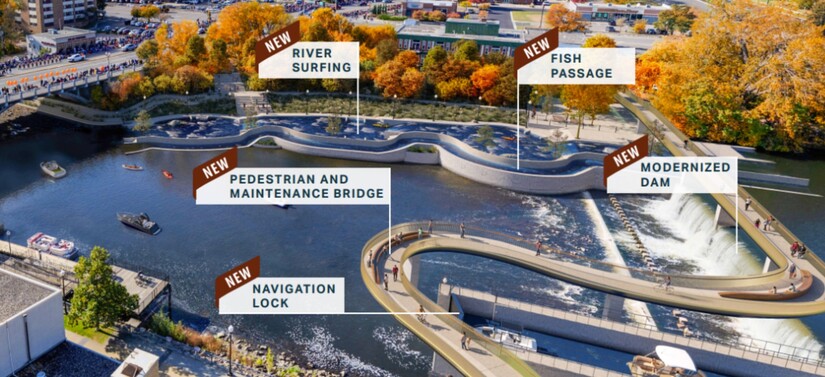Image


ANOKA, Minn. — The City of Anoka is moving forward with a transformative $51 million proposal to modernize the Rum River Dam and revitalize its downtown riverfront — a sweeping infrastructure and recreation initiative that now faces a legal challenge from Anoka County over the project’s funding.
City officials describe the Rum River Dam overhaul as a once-in-a-generation opportunity to improve public safety, ecological resilience, and local recreation while bolstering downtown Anoka’s economic vitality.

According to legislative documents, the comprehensive plan includes:
“This project combines safety, ecology, and recreation — creating something truly unique for our region,” Anoka City Manager Greg Lee said in legislative filings.
The total cost of the Rum River Dam modernization is estimated at $51 million, reflecting inflation and design expansions since the city’s 2024 feasibility study, which projected a construction cost of roughly $37 million (in 2024 dollars).
Anoka secured a $500,000 state grant in 2023 to conduct a feasibility study and initial design. The city’s current legislative request seeks an additional $5.6 million to complete preliminary engineering, environmental review, and public engagement.
Under the proposed schedule:
City officials expect to pursue a mix of state bonding, federal grants, and private partnerships to finance the full project. They describe the effort as a strategic investment in river safety, ecological restoration, and downtown revitalization.
The Rum River Dam redevelopment faces a major obstacle: a lawsuit filed by Anoka County against the Minnesota Department of Transportation (MnDOT).
Filed in October 2025, the suit seeks to block $6.2 million in state funds that lawmakers redirected from Anoka County’s transportation sales-tax revenue to help fund the dam project’s pedestrian bridge.
County officials claim the Legislature acted unconstitutionally by reallocating county-designated transportation funds without the county’s consent. The lawsuit labels the pedestrian bridge a “dubious boondoggle” and asserts that the money was originally intended for countywide trail and park improvements.
“The state can’t simply take our transportation dollars and hand them to a city for a pet project,” the county’s legal filing states.
The provision authorizing the transfer was championed by Rep. Zack Stephenson (DFL–Coon Rapids) and included in a broader transportation bill passed during the 2025 legislative session. Supporters argue the funding supports regional economic and recreational benefits, while critics describe it as a last-minute legislative maneuver that bypassed local oversight.
The City of Anoka is not a party to the lawsuit but acknowledged it is the intended recipient of the redirected funds. In a public statement, the city said it “appreciates the Legislature’s support for a project that enhances regional safety, ecology, and recreation.”
Built in 1969, the Rum River Dam continues to rely on manual flashboards, limiting modern water-level management and increasing safety risks. Upgrades to automated crest gates would improve flood control, debris removal, and maintenance efficiency.
The project’s fish-passage system also carries ecological importance. Environmental experts, including those from the Anoka Conservation District, note that restoring river connectivity will help native fish species access critical spawning habitats along the Rum River corridor.
At the same time, local leaders and tourism advocates see the whitewater recreation park as a potential economic driver. By integrating river recreation with Anoka’s historic downtown and designated social district, officials project increased visitor traffic, small-business growth, and event activity.
“Whitewater parks across the country have shown strong returns in local tourism and business engagement,” project materials note. “We believe Anoka can lead the way in Minnesota.”
With the Legislature considering new infrastructure bonding requests and the Anoka County–MnDOT lawsuit pending in court, the future of the Rum River Dam overhaul remains uncertain.
Supporters see it as a forward-looking investment in infrastructure, ecology, and community growth. Critics warn it could set a troubling precedent for how the state reallocates county revenue — and question whether the benefits justify the $51 million price tag.
If fully funded, construction could begin by 2028, potentially transforming downtown Anoka into a hub of river recreation, environmental stewardship, and economic vitality.